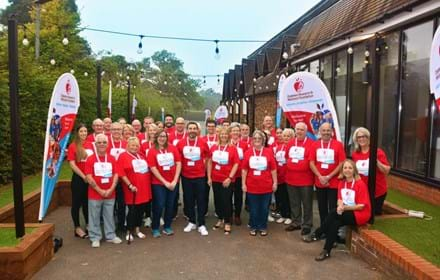
New guidance published for people with early-stage type 1 diabetes
International guidance available now offering support for people with early-stage type 1 diabetes
Guidance on how to monitor and support people with early-stage type 1 diabetes could help reduce the trauma associated with being diagnosed with the condition.
Recently published international guidance could enable people newly diagnosed with type 1 diabetes to access the latest treatments to delay the need for insulin therapy and reduce long-term health complications.
The report published in Diabetologia aims to establish how people should be supported and monitored to reduce the mental and financial burden of type 1 diabetes, allowing people to live well with their diagnosis.
With increased understanding of type 1 diabetes and how it develops, it is now possible to screen people for the condition and diagnose in its early stages before insulin therapy is needed.
Authors suggest this breakthrough enables type 1 diabetes to be treated like never before.
The guidance establishes for the first time how adults, children, and pregnant individuals diagnosed as “at risk” of or with early-stage type 1 diabetes should be supported and monitored.
This includes the best methods and recommended frequency for re-testing to monitor condition progression across pre-symptomatic stages, as well as the point at which insulin should be introduced.
The information allows people to prepare for life with the condition and the possibility to receive therapies that have the potential to delay the onset of symptoms and their need to take insulin.
Type 1 diabetes is an autoimmune condition that progresses gradually in stages. It is usually diagnosed at a point when insulin treatment is already required, which can result in hospital stays.

If type 1 diabetes is not identified quickly enough it can also lead to diabetic ketoacidosis (DKA), which can be fatal. It is estimated that one in four children (25.6%) are diagnosed with type 1 as an emergency in DKA in the UK.
Monitoring can significantly reduce the incidence of DKA at diagnosis and facilitate education about the signs and symptoms to look for as the stages of type 1 progress.
Evidence shows that identifying type 1 diabetes in these early stages, known as early-stage or presymptomatic type 1 diabetes, has significant mental and physical health benefits. These include preventing DKA and long-term health complications, while also being more cost effective for healthcare systems.
In the UK and around the world, there are research projects screening children and adults for type 1 diabetes. But prior to this guidance, there was no consensus on how best to monitor disease progression in people with early-stage type 1 diabetes.
The report outlines several recommendations compiled by Breakthrough T1D, formerly JDRF International, and endorsed by organisations including the American Diabetes Association, the European Association for the Study of Diabetes, and the International Society for Paediatric and Adolescent Diabetes.
The publication recommends partnerships between diabetes specialists and primary care to provide people with early-stage type 1 diabetes with regular blood glucose checks, education about type 1 diabetes and access to clinical trials and emerging treatments. It also outlines what is required among health care practitioners to ensure pre-symptomatic detection and follow up is successful, and the educational needs and psychosocial support that individuals and families may require are met.
Another detail in the guidance states that people with early-stage type 1 diabetes should be offered approved therapies to delay their need for insulin treatment. If none are approved where they live, they should have the opportunity to participate in clinical trials of emerging therapies. The guidance also emphasises the need for further research involving people at-risk of and those with early-stage type 1 diabetes to increase the rigour of future recommendations and inform clinical care.
More than 60 international type 1 diabetes experts co-authored the consensus document.
Dr Rachel Besser, Consultant Paediatric Diabetologist at the University of Oxford, chaired the working group on monitoring in children and adolescents for the report. Dr Besser leads the UK registry for children, young people and adults who are at risk of type 1 diabetes.
Dr Besser said: “This consensus fills a much-needed gap, by providing straight-forward and actionable advice to healthcare professionals about how to monitor and support children, young people and adults with biological markers of type 1 diabetes, who are either at risk of the condition, or who are in its early stages. Screening children for type 1 diabetes is not enough to prevent life-threatening illness: once identified they and their family need education, support, and monitoring to identify progression to type 1 diabetes early. We are already using this guidance in our national pre-type 1 diabetes clinic, and it works.”
Read the report in Diabetologia
Read more about type 1 diabetes
I would like to make a regular donation of
I would like to make a single donation of
There are lots of ways to raise money to support
people living with all forms of diabetes.
Bake, Swim, Cycle, Fly ... Do It For DRWF!
Fundraise with us
Recent News


